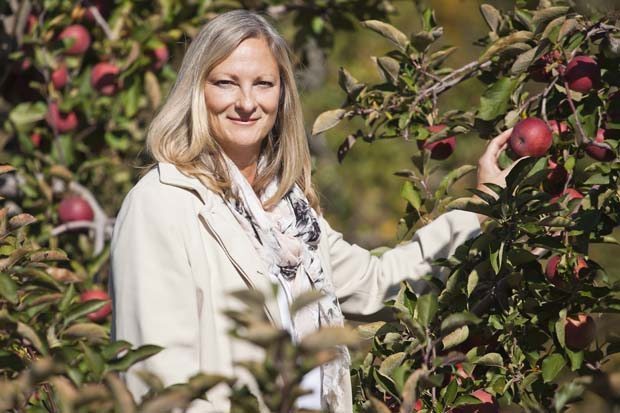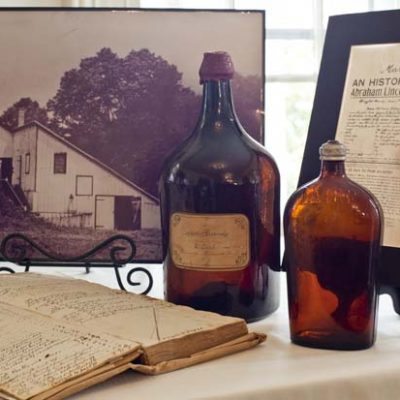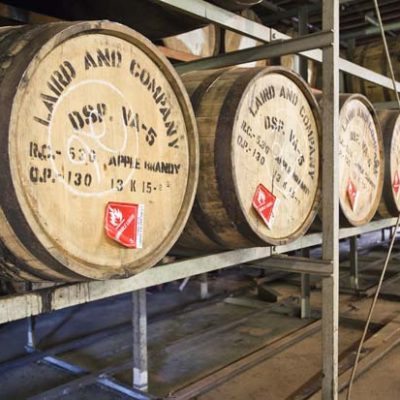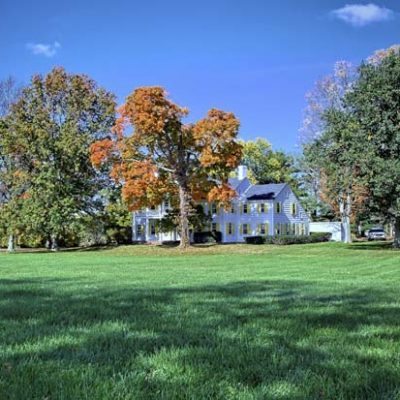
America’s first liquor license belongs to a family-owned New Jersey distillery whose descendants carry on the proud legacy of producing “Jersey Lightning” today
by Laura D.C. Kolnoski • photos by Robert Nuzzie
When George Washington rode through Monmouth County, he visited the Colts Neck Inn on the Burlington Path (now Route 537), a stop frequented by stagecoaches and dispatch riders. The
Inn was owned by Robert Laird, whose Scottish ancestors established it after coming to America in 1698. When Laird joined the Revolution under Washington’s command, his inn doubled as a headquarters of the Colonial resistance.
It was a popular place, not just for its food and lodging, but for the Applejack brandy produced and served there; made from a recipe developed by Laird’s great-grandfather William using locally abundant apples, and he supplied Washington’s troops with Applejack when they were stationed nearby. General Washington, who wrote about the production of “cyder spirits” in his diary, requested and received the recipe. To this day, America’s first president is the only family outsider
to have obtained it.
The Applejack distillery flourished behind the Colts Neck Inn until 1849, when a fire burned it to the ground. A fifth generation Laird re-built the distillery further east on the same road where it
stands today, in a section of the township known as Scobeyville, named for Captain Levy Scobey, who in 1848 established the General Store which still operates next to the Colts Neck Inn. The inn has changed hands over the decades and currently operates as a tavern/restaurant and banquet
hall. A plague attesting to its historical significance was placed outside by the local Historic Preservation Committee.
The art of producing Applejack has been passed down through generations of the Laird family. They survived Prohibition by turning their apples into non-alcoholic cider and applesauce. In September 1933, Laird & Company was granted Federal License #1 under the Prohibition Act to distill apple brandy for medicinal purposes. Not only was the company able to re-open the distillery, but the license enabled it to have aged inventories of Applejack available immediately
after Prohibition was repealed. Facilities were modernized and production continued until World War II when the plant produced apple-related products to support the war effort.
Today, the Laird family is recognized as the oldest family of distillers in the country. Ninth-generation Lisa Laird Dunn, executive vice president, is the public face of the firm (her father Larrie is president and CEO). Armed with antique jugs, artifacts, historic documents, and a wealth of knowledge, she travels the country to speak before wholesalers and historical societies, at retailer and other events, keeping alive 300 years of tales, anecdotes, and Laird lore.
Lisa was the last Laird to live in the circa 1700s stately white house—its yellow shutters so familiar to the multitudes traveling Route 537 from eastern Monmouth County’s to the county seat in Freehold. Her current office is in her father’s childhood bedroom. Laird Road runs along the side of what is now the company’s office headquarters. She oversaw the building’s recent renovation, having the original floors hand-sanded, retaining the wood beams and fixtures installed between 1920 and 1950, and mending the plaster walls (plumbing and electrical were also upgraded). The house fronts a 22-acre complex that includes a 155,000-square-foot bottling facility/ warehouse and a barrel warehouse built in 1933. Smaller older buildings dot the property, one a barn Lisa plans to turn into a museum and visitor’s center in 2017.
While no ghosts have ever actually been seen in the old house, on numerous occasions items have moved inexplicably from one place to another or fallen for no reason. During the recent renovations, instances of flickering lights baffled electricians. Lisa hopes that was a signal of approval of the work by an ancestor referred to as Great Uncle Joe.
“Things disappear all the time,” she said. “It’s just a feeling people get in the home. Not many people have a history like we do, and there is not as much opportunity to talk about history these days. I only realized how important that is—especially
for young people—as I got older.”
She envisions an education room in the museum where visitors can learn about the products, complete with a small non-operational still. It would be a place to perpetuate stories about Abraham Lincoln serving Applejack in his New Salem, Illinois tavern and President Lyndon B. Johnson presenting a case of it to Soviet Premier Alexei Kosygin at a 1967 summit in Glassboro.
While 35 employees work at the Scobeyville site, apples now come from orchards in Virginia’s Shenandoah Valley, where Laird & Company owns a distillery. Distilling in Monmouth County ceased in 1972 due to the loss of the area’s orchards to development. (Eastmont Orchards, directly across Laird Road from Laird & Company, remains a popular pick-your-own spot, but no longer
supplies the company as it once did.)
Among the apple varieties used by Laird’s are Jonathans, Winesaps, Staymans, Pippins, and Delicious. Applejack was the key ingredient in popular early American punches and
drinks. During William Henry Harrison’s presidential campaign in 1840, cider flowed so freely at Whig rallies that Harrison became known as the “Hard Cider Candidate.” Eligible voters were invited to feasts at which hard cider laced with Applejack were consumed (one reporter wrote that “spirit” had won Harrison the election). During Prohibition, a drink of two parts hard cider to one part Applejack called the “Stonewall Jackson” was in vogue, as was the “Jack Rose,” also created during this period.
“We had lean years in the ’70s, ’80s, and even the ’90s as folks were drinking vodka and gin, not brown liquors like Applejack,” Lisa said. “But we continued to sell the product because it’s the heart and soul of the company, and our flagship brand. Our hard times were never as bad as our ancestors had during Prohibition, though. With the resurgence of classic cocktails and brown spirits, now we can’t produce enough. Bartenders are so appreciative we are still in business.”
To meet the demand, the distillery and production have been increased. This year, Laird’s introduced a new “Jersey Lightning” brand of un-aged, clear straight apple brandy, resurrecting the name from Colonial days. “We are looking to add more new formulas and products,” she said.
Laird & Company, which cannot sell direct due to existing New Jersey laws, established an import division 20 years ago focused on wines, spirits and liqueurs, olive oils, and vinegars from around the world. Laird’s labels include Senator’s Club and Banker’s Club bourbon, scotch,
vodka, whiskey, gin, rums, and brandy. The company remains America’s sole remaining Applejack producer. Today, in addition to Lisa and Larrie, Lisa’s cousin John Evans Laird III serves as another executive vice president, while her mother Rose Marie is secretary on the board of trustees. Her two children— son Gerard James IV, a college sophomore, and daughter Laird Emilie, in high school—are on board to continue the family tradition.
The Lairds also share family legacies through their cookbook, AppleJack: The Spirit of Americana (Laird, 1992). Among the recipes, many ideal for festive holiday celebrations with a twist, are Martha Washington’s Applejack Walnut Cake with Orange Applejack Glaze. A holiday poultry recipe features Applejack stuffing with apple jelly glaze. Other mouthwatering
options with a Jersey kick include glazed baked ham, Applejack trifle, and the temptingly named New England Berry Grunt with Apple Brandy Sauce.
“As the ninth generation, I feel it’s imperative, and my family duty, to continue the business,” Lisa said. “My ancestors had no inkling 300 years ago that the company would still be in business today.”
Laird & Company
1 Laird Road, Scobeyville (Colts Neck)
732.542.0312 / sales@lairdandcompany.com








